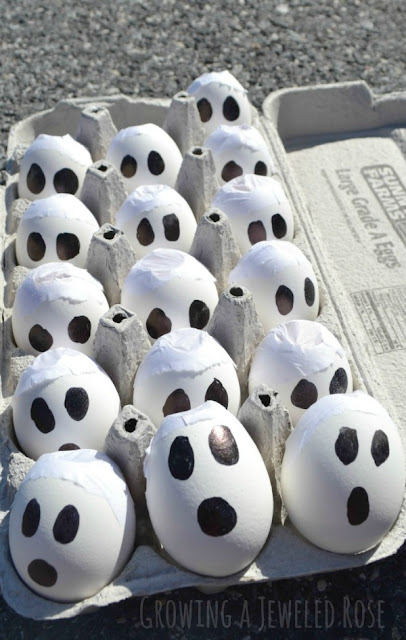
Please click here to view all crafts and art for fall and Halloween and Thanksgiving with kids

Many au pairs and host families are looking for places to get flu shots this time of year. Au Pair insurance does not cover immunizations, but there are lots of places to get flu shots for $30 or less. If the host family is insisting that an au pair get a seasonal flu shot and she agrees to get it, the host family would be responsible for the expense.
If you are planning to get the seasonal flu vaccine, it is recommended that you get it as early as possible.
Many area pharmacies and grocery stores are offering walk-in flu shots this year including: Walgreens, CVS, Target and Stop&Shop.

Columbus Day, which is observed annually on the second Monday of October, remembers Christopher Columbus’ arrival to the Americas on October 12, 1492.
Americans are often invited to celebrate the anniversary of the discovery of their country with church services and other activities. In some towns and cities, special church services, parades and large events are held. Most celebrations are concentrated around the Italian-American community. The celebrations in New York and San Francisco are particularly noteworthy. In Hawaii Columbus Day is also known as Landing Day or Discoverer’s Day. Not all parts of the United States celebrate Columbus Day. It is not a public holiday in California, Nevada and Hawaii.
For more information about this holiday go to: http://www.history.com/topics/columbus-day
For activities for children including arts and crafts, word searches, puzzles and more facts and history go to http://www.theholidayzone.com/columbus/
 We are very proud of the ongoing training we offer our au pairs which provides further educational guidance on a wide range of topics. Our orientation trainers take great care to research and prepare the topics presented via Webinars to our au pairs once placed in the home of a host family. Here is the list of what we have coming up:
We are very proud of the ongoing training we offer our au pairs which provides further educational guidance on a wide range of topics. Our orientation trainers take great care to research and prepare the topics presented via Webinars to our au pairs once placed in the home of a host family. Here is the list of what we have coming up:
October 15
8 pm Nutrition. Good eating for you and your kids
9 pm It’s Up to You. Making the most of your Au Pair year
10 pm Activities to do with Preschoolers
October 29
11 am Language Development: Birth and beyond
12 noon Tantrums are no fun for anyone. Help, my kids are fighting again!
1 pm American holidays: what they are, activities and getting through the holiday blues
November 11
8 pm Managing play with more than one child
9 pm Repatriation
10 pm Feeling Sad or Stressed: Tips for gaining balance in your life
November 26
11 am Help! My kids are fighting again
12 noon Activities for School Age Kids
1 pm Homesickness. Making it through
December 5
8 pm Activities to do with Preschoolers
December 6
9 pm Successfully communicating with your host family
December 9
10 am Homework: Finding the right strategy for your child
December 15
9 pm Homesickness. Making it through
December 17
8 pm Tantrums are no fun for anyone
Last Sunday we met at my house to do an apple crisp together. Many new aupairs arrived and they had a chance to make friends and get information on education and our Boston cluster in general.
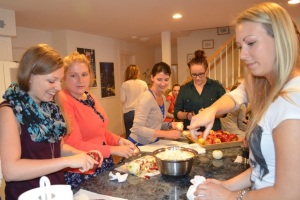
Judith D from Austria, Emily from the UK, Clemence from France, Esther from Germany and Anna K from Austria
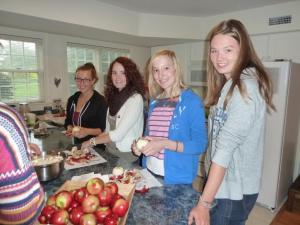
Jessica W, Ramona, Rebecca F and Anna R from Germany busy peeling apples
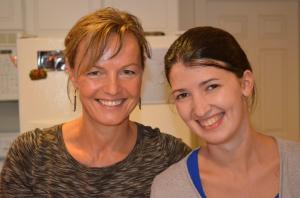
Clemence from France arrived in our cluster and resides in Back Bay
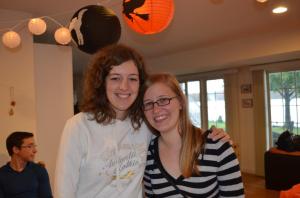
Lea from France and Nora from Germany live in the Chestnut Hill neighborhood together
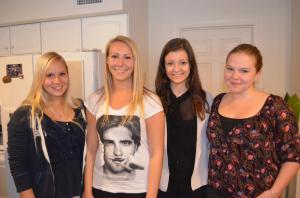
Angelique from Germany, Anna K from Austria, Rebekka and Marisa from Germany
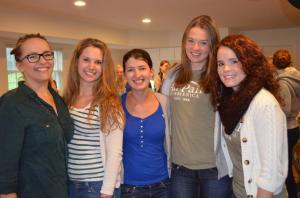
Esther from Germany, Korina from Croatia, Clemence from France are in the standart aupair program. Anna R and Ramona from Germany are in the Educare program
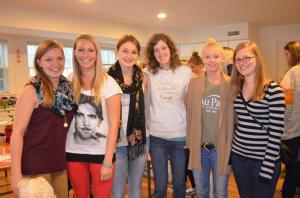
Judith H, Anna K and Kate T from Austria, Lea from France and Michaela and Nora from Germany
All aupairs in the standart aupair program and in the extraordinaire program need to get 6 credits during the first year as an aupair to fullfill the education part of the program. An Educare aupair will need to get 12 credits during this time.
In the Educare aupair program are: Ramona, Rebecca F, and Anna R from Germany and Kate from Austria.
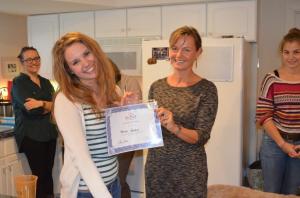
Korina from Croatia got her certificate for reaching the required 6 credits on the education part. She spend one whole year with a hostfamily in the South End in Boston and will go back home this week. She gave information on her experience of being an aupair to all others.
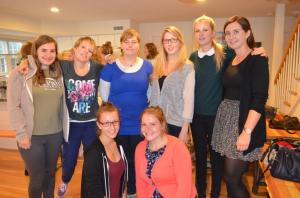
Sophie and Laura G from Germany, Pieta from Finnland, Judith H from Germany, Christina from Denmark, Kristina and Jessica W from Germany and Emily from the UK.
Laura G and Judith H from Germany, Anna K from Austria as well as Emily from the UK are in the Extraordinair aupair program which means they have a special qualification and experience in the field of childcare already before they started their year as an aupair.Being a preschool teacher, a midwife or a nurse would give them such a special qualification.
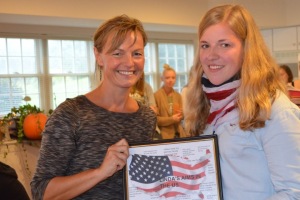
Linda from Germany was one of the winners in our fall competition to submit their bucket list on what they want to archive and experience during their aupair year. Congratulations to Linda from Germany who resides in Beacon Hill in Boston.
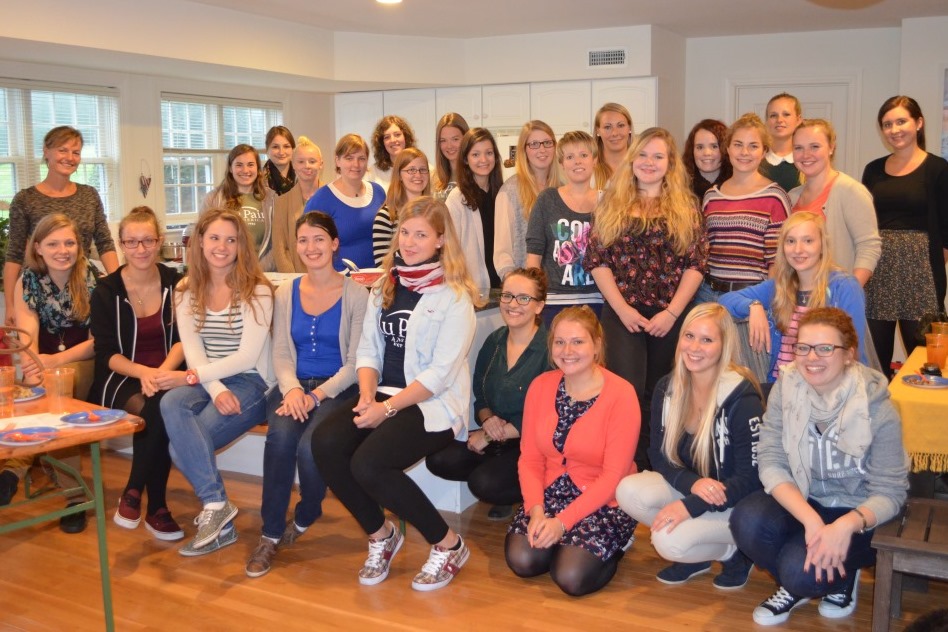
View more pix at : October cluster meeting 2013
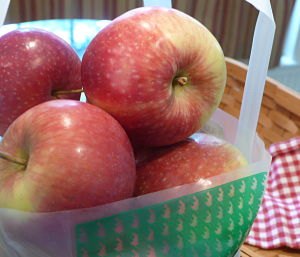
Instructions for some favorite apple recipes follow. Kids can even help with some of them; just be careful with the sharp knives.
Apple Crisp
Serves 6
Prep: 15 minutes; Bake 40 minutes
Ingredients
4 green apples, peeled and thinly sliced
1/2 cup brown sugar
1/2 cup flour
1/2 cup oats
3/4 teaspoon cinnamon
3/4 teaspoon nutmeg
6 tablespoons butter
Directions
More recipes you will find here: Recipes with apples
Au Pairs – Imagine for a moment that you went to the hospital and you were in the care of doctors and nurses. How would you feel if those doctors and nurses who were there to care for you were more interested in texting or using their personal computer than caring for you? How would that make you feel, about yourself and about them? Would you think that you were getting the treatment you deserved? Would you feel like paying the bill after your stay?
Life as an au pair, it is a fine balance between employee and family member. You live with your host family and participate with them as a member of the family, but you also have clear responsibilities as a childcare provider. Being a childcare provider is truly one of the most important jobs I can think of, because you are helping to shape our next generation. What message are you sending them when you would rather interact with a computer than with them? How will they feel about themselves and about you? Children feel as though everything is about them. They will see this as a rejection of them and they will be more likely to act out.
It also poses a safety concern when you are not paying enough attention to the children in your care. Accidents happen, but when an adult care giver is close by and appropriately supervising the chances of a major injury dramatically reduce.
 During work hours, the following would not be considered acceptable:
During work hours, the following would not be considered acceptable:
-Texting
-Talking to friends on the phone
-Chatting with friends online
-Using Skype or Facetime
-IMing
-Emailing
-Updating your status on Facebook
-Using Orkut, Google+, Studivz, SiempreGente or any other social media site
-Watching videos on YouTube (even my really fabulous ones)
-Tweeting on your Twitter
-Uploading photos on Instragram or Vine
-Anything else on the computer unless it is going to Nickjr.com together with your host children
Think about this — even if you work 45 hours a week, that leaves you 123 hours per week for all of that other stuff, or about 70 hours (if you are getting the recommended 7-8 hours of sleep per night.)
Host Parents – You need to be clear about what you consider acceptable during work hours to avoid misunderstandings. Also, please understand that you are dealing with a new generation of people who are very accustomed to being plugged in at all times. Their intention is not to be rude, they don’t necessarily realize how their actions will be perceived. Please use this information as an opportunity to begin a dialogue on the issue.
Au Pairs from the Boston area gather each year to tour the hallowed grounds of Harvard University. On a beautiful September day over 80 girls came to Cambridge to learn about student life and the diversity of one Americas oldest and most prestigious schools.
Tour guides provided us with historical facts and stories. Did you know that the statue of John Harvard (which by the way is not John Harvard, but a student who was asked to model, in the absence of any known pictures of John) is the 3rd most photographed statue in the country? Want to guess what the top two are? Needless to say the day was full of interesting facts and sights of Harvard!
click here for pictures —-> Harvard Tour 2

If this article seems to be too much about “basic life skills” for your tastes, stop for a moment and think about people you’ve met who put little or no effort into their personal appearance. Think of people with bad breath or greasy hair and how your opinion of them subtly changed when you noticed these things. This advice is primarily for those people, but also as a reminder to everyone that the small efforts of personal appearance are tiny investments that do pay off.
Personal appearance is one of those subtle things that’s difficult to quantify. Mostly, it’s a collection of a lot of small investments of time and effort that add up to a slight but noticeable tweak in how people think of you. The difference is real, and over time these small differences in a lot of interactions and events can really add up. Keeping clean and keeping up a good appearance are also great ways to simply feel good – I know for me personally, few things make me feel better than a hot, soaking shower. Even better, personal appearance is something that you can maximize – or at least significantly improve – with just a bit of effort. Here are a bevy of little steps you should be taking to maximize the value of your personal appearance, from the obvious to the subtle.
Maintain a daily hygiene schedule.
For some people, setting aside time each and every day for basic personal hygiene is a challenge. They’re wrapped up in work, super-involved with their families, and have too many things going on, so they’ll just skip an evening shower and make things look all right in the morning, or they’ll simply fall into bed without thinking about it and then get up so late in the morning that they have to bolt out the door to start taking charge of their responsibilities.
Hygiene is important. Schedule some time each day to take care of things. I usually do my hygiene tasks the moment I wake up, and I have a litany of things that I go through as part of the routine. If you don’t have an established routine that is simply a fundamental part of your day, start one. Literally make a list of things to do and do them every day. That time you invest will pay off in the long run because you’ll be constantly providing a subtle positive cue to others about yourself – and you’ll feel better, too.
Take a bath or shower and clean thoroughly.
When I was in school, I bathed in a shared shower situation with a lot of other people and I witnessed people standing under the shower for a few minutes, flopping a bit of soap lather on themselves, rinsing it off, and getting out. If that sounds like your average shower, you need to start scrubbing a bit more. Lather up a washcloth with a lot of soap and use it to scrub down all of your body. Rub vigorously everywhere, then rinse. If the place produces significant odor, do it two or three times. Trust me – at the end of the day, this will leave you feeling much fresher than if you just take an ultra-quickie shower.
Don’t use antibacterial soap.
Antibacterial soap might kill off some of the bacteria on your skin, but that’s bad for two reasons. First of all, it lowers your own resistance to a variety of bacteria, making you more susceptible to bacteria-borne illness. Second, if a soap kills off 99.9% of bacteria, the 0.1% that’s left is going to be resistant to that soap and will thrive. In the words of Dr. Stuart Levy, a microbiologist at Tufts University: “Dousing everything we touch with antibacterial soaps and taking antibiotic medications at the first sign of a cold can upset the natural balance of microorganisms in and around us, leaving behind only the superbugs.” Use some quality soap, but don’t use antibacterial soap – it has no real benefit and may in fact make you sick over the long haul.
Brush your teeth and floss
One of the first things I notice about a person is whether their breath smells badly. For some people, this is a medical condition; for others, it’s a side effect of too much garlic. Either way, you can go a long way towards preventing it by practicing good oral hygiene. Brush your teeth every day and floss them, too.
A clean mouth and clean teeth give you a nice smile and fresh breath, both of which are major positives for one’s personal appearance. It just takes a good scrubbing in the morning to cause it, so don’t skip over brushing your teeth.
Use deodorant.
A scentless odor-blocking deodorant, preferably one that does an effective job of absorbing moisture, can do wonders for both minimizing any potential body odor and for keeping any moisture from appearing on your clothing. Most deodorants work pretty well for the average person – don’t overthink it, just apply it.
Keep your hair clean and trimmed evenly
The important thing is to keep it clean. Clean hair, even if it’s a bit disheveled or not cut perfectly, does wonders for a person’s appearance. When you take a shower or bath, give your hair a thorough scrubbing.
Minimize body artwork unless it clearly doesn’t matter or is beneficial to your career.
I’ve personally witnessed this body art causing a social stigma for them, if they have several pieces visibly evident beyond their clothing. They could be avoided on the street, passed over for work promotions, and could face various subtle social stigmas because of the art.
If you choose to have body art, be aware that for many people, such art is in fact a social stigma and that you will suffer for it in various ways, both subtle and non-subtle. In some careers and some social strata, body art is inconsequential or even encouraged, but this is far from true for all careers and all social strata. In a nutshell, be very careful of the long-term consequences if you are considering some form of permanent body art.
Dress well
At a minimum, make sure what you’re wearing is clean and presentable, though, as people will visit and draw a number of conclusions based on your appearance
Greet everyone you meet, smile, and willingly engage in conversation.
All of this only takes a few moments, but it creates a very positive impression of you in a social sense, particularly when combined with good hygiene and good appearance. It only takes a few greetings from a well-scrubbed person to develop some level of positive feelings towards that person, and that’s something that’s always good to have in your corner.
Here’s the bottom line: keep yourself clean and presentable, dress well, and interact positively with others. It takes time, effort, and a bit of money to pull that off, but if you do, you’ll create an overall positive impression of yourself with everyone you interact with, and that positive impression is something very, very valuable to have.